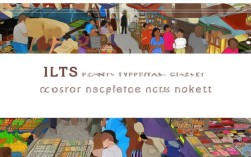在雅思口语Part 1中,book”的话题是高频考点,主要考察考生对日常阅读习惯、书籍类型偏好及阅读意义的简单表达能力,这类问题看似基础,但需要考生用自然的口语化语言,结合个人经历展开,同时注意语法准确性和词汇多样性,以下从常见问题、回答思路、实用表达及备考建议四个方面,为大家提供详细解析。

常见问题及回答思路
雅思口语Part 1关于“book”的问题通常围绕“阅读频率”“书籍类型”“最近读的书”“阅读的意义”等展开,以下是典型问题及回答框架:
Do you like reading?
回答思路:先明确态度,再补充具体原因或例子,避免简单回答“Yes/No”。
- 示例:
“Yes, I’m really into reading. It’s not just a hobby but also a way for me to relax after a busy day. I usually spend about 30 minutes before bed flipping through a book, which helps me unwind better than scrolling through my phone.”
What kind of books do you like?
回答思路:说明具体类型(如小说、科幻、历史等),并解释喜欢的原因,可结合个人经历。
- 示例:
“I’m a big fan of science fiction, especially books by authors like Liu Cixin. His novels, such as The Three-Body Problem, not only imagine fascinating future worlds but also explore philosophical questions about humanity and technology. I love how they make me think beyond daily life.”
Do you prefer physical books or e-books?
回答思路:对比两者的优缺点,并明确个人偏好,给出理由。
- 示例:
“I prefer physical books, though e-books are more convenient. There’s something special about holding a real book—the smell of paper, the weight in your hands, and flipping through pages makes the reading experience more immersive. Plus, physical books don’t strain my eyes like screens do.”
When did you start to like reading?
回答思路:回忆童年或学生时期的阅读经历,强调关键事件或人物的影响。
- 示例:
“I think my love for reading started when I was about seven. My mom used to read me bedtime stories, and I was fascinated by the adventures in those books. As I learned to read on my own, I would finish entire series in a week, and that’s when I realized how powerful stories could be.”
What was the last book you read?
回答思路:书名+作者+简单内容+个人感受,注意细节描述。
- 示例:
“The last book I finished was Educated by Tara Westover. It’s a memoir about her journey from growing up in a survivalist family to earning a PhD from Cambridge University. What struck me most was her resilience—how she taught herself everything from scratch despite having no formal education. It made me appreciate the value of learning and determination.”
实用表达与词汇
回答时,使用多样化的词汇和句式能让表达更生动,以下是分类整理的实用表达:
| 类别 | 表达示例 |
|---|---|
| 阅读频率 | “I read every day.” “I’m an avid reader.” “I dip in and out of books regularly.” |
| 书籍类型 | “Fiction/non-fiction.” “Science fiction/fantasy.” “Biography/self-help.” |
| 阅读感受 | “It’s captivating/engrossing/thought-provoking.” “I couldn’t put it down.” |
| 阅读目的 | “For pleasure/relaxation/knowledge.” “To escape reality.” |
| 对比观点 | “While e-books are portable, physical books offer a tactile experience.” |
回答技巧与注意事项
-
保持口语化:避免使用过于复杂的书面语,多用缩略形式(如“I’m”“don’t”)和自然衔接词(“well”“you know”“actually”)。
- 正例:“Well, I guess I’d say I enjoy reading, especially when I’m free.”
- 误例:“I am extremely fond of reading, particularly during my leisure time.”
-
补充细节:用具体例子支撑观点,让回答更真实,例如提到喜欢某本书时,可描述一个情节或角色对自己的影响。
-
控制时长:Part 1每个问题回答约20-30秒,避免过短(1-2句)或过长(超过1分钟)。
-
语法与发音:注意时态一致(如描述过去读的书用一般过去时)、主谓一致,并清晰发音关键词(如“fiction”“memoir”)。
备考建议
-
准备个人经历:梳理自己与阅读相关的故事(如第一本喜欢的书、难忘的阅读经历),确保回答有真情实感。
-
积累话题词汇:针对“书籍类型”“阅读场所”“电子书与纸质书对比”等子话题,背诵相关词汇和句型。
-
模拟练习:找语伴或对着镜子练习,录音后回听,纠正语法错误或发音问题,注意语速适中、语气自然。
-
拓展思路:思考问题的延伸方向,例如被问“Do you like reading?”时,可主动提及阅读时间、地点或偏好,避免被动回答。
FAQs
Q1: 雅思口语Part 1回答“book”类问题时,需要多高级的词汇?
A1: 无需刻意堆砌高级词汇,重点是用词准确、自然,基础词汇搭配恰当的语境(如用“get lost in a book”表达“沉浸书中”)比生僻词更有效,考官更关注你的语言流畅度和逻辑清晰度,而非词汇难度。
Q2: 如果没读过什么“有名”的书,会影响得分吗?
A2: 完全不会,Part 1考察的是日常交流能力,而非阅读量,可以分享简单的读物(如儿童故事、漫画、杂志),或强调阅读的“过程”而非“内容”(如“I enjoy reading short articles online because they’re quick and informative”),真实性比“高大上”的书单更重要。











